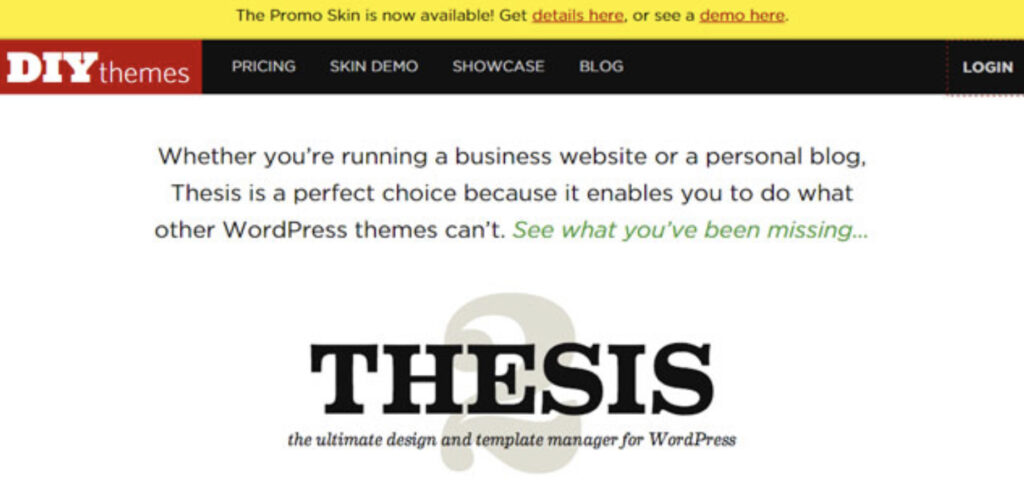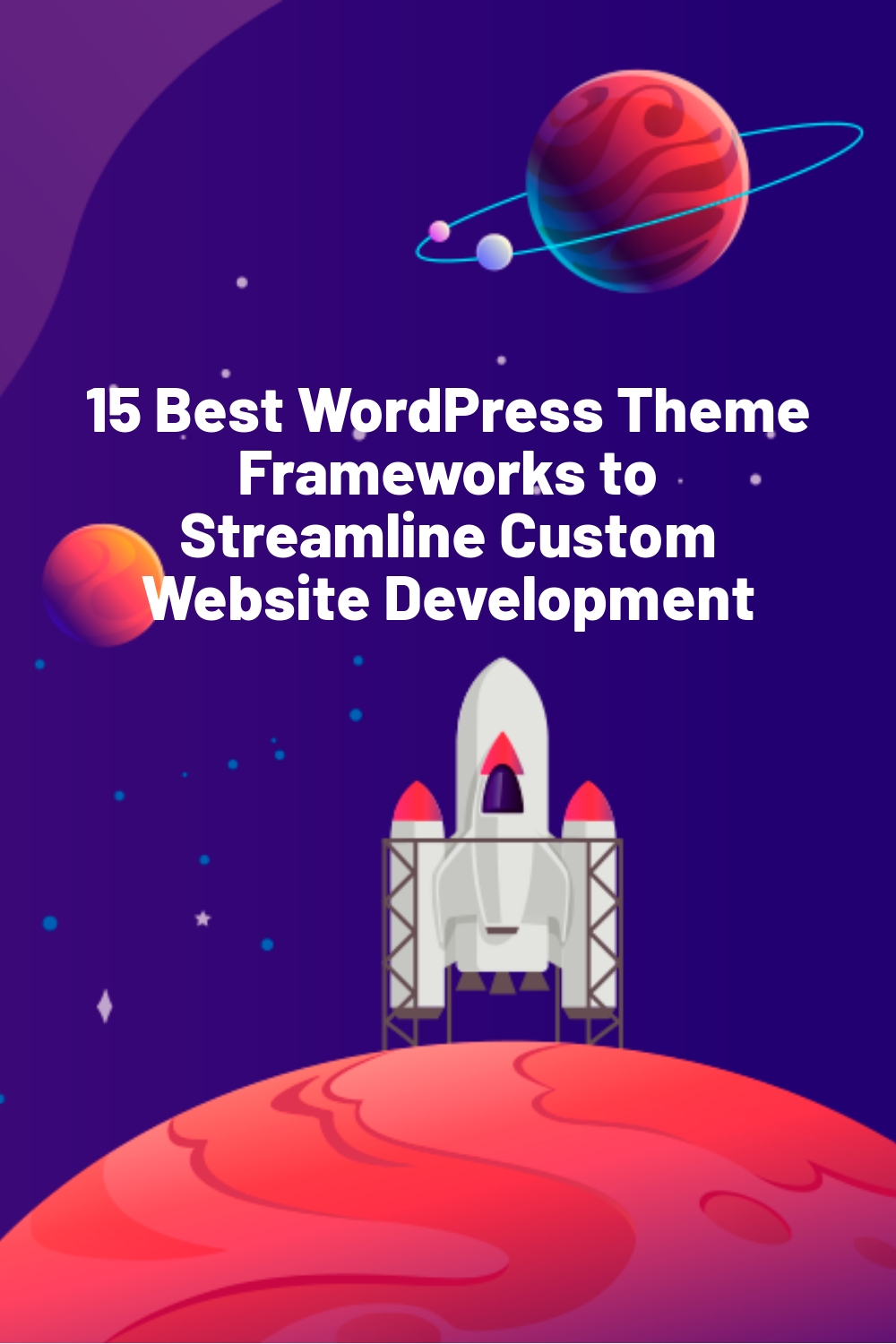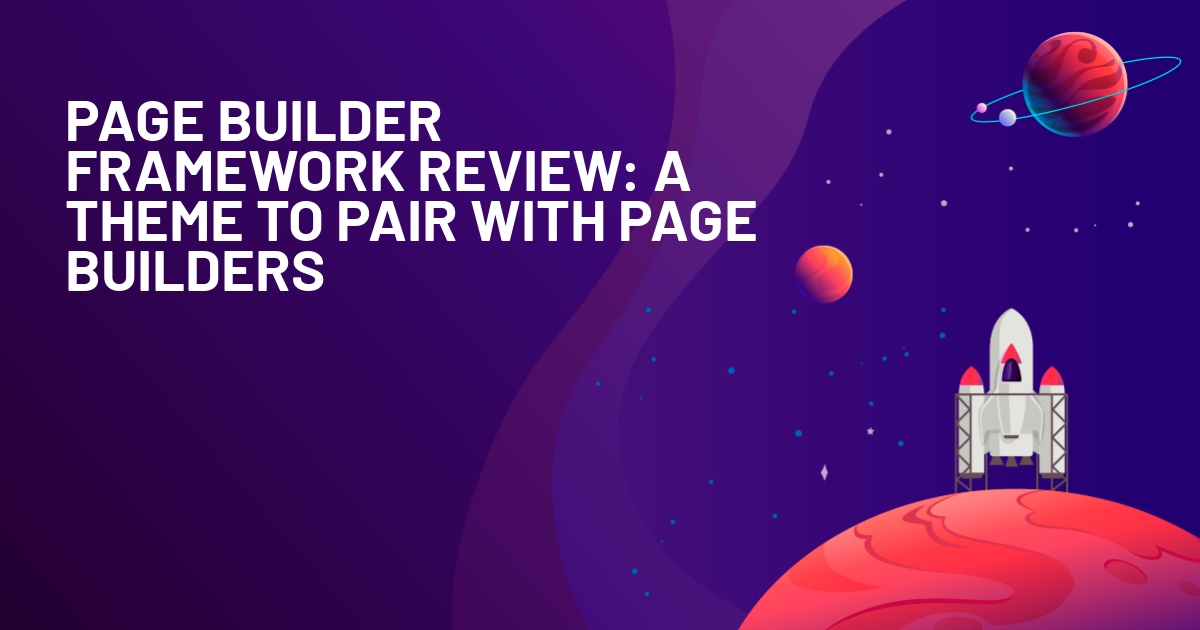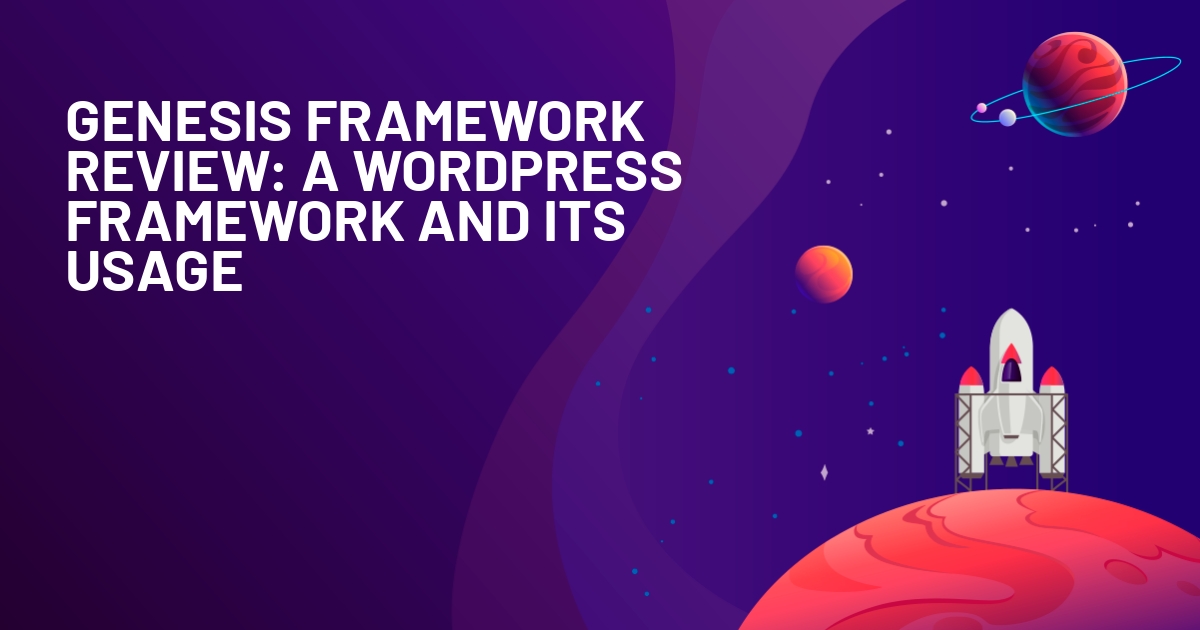WPLift is supported by its audience. When you purchase through links on our site, we may earn an affiliate commission.
15 Best WordPress Theme Frameworks to Streamline Custom Website Development
If you’ve been using WordPress for a while, you’re probably aware that customizing a theme wasn’t always as easy as it is now. In reality, any custom code you’d previously added would be lost every time you changed a theme.
Webmasters had no choice but to keep track of any changes and improvements they made to the code. However, this time-consuming method is no longer a problem thanks to WordPress theme frameworks.
This article lists some of the best WordPress theme frameworks for web developers to use while creating themes.
Divi by Elegant Themes

Divi can be used for a variety of purposes and can be adapted to any kind of website. In other words, Divi promises to be able to manage any site you choose to build (as well as any design).
Divi is also built with the novice in mind. Everything from setup to the guide and how to handle updates, later on, has been designed so that even a total novice can easily grasp it.
Price
- $89/year
- Lifetime Access – $249
Pros
- Divi is a fully usable WordPress theme that can be used right away. It doesn’t need any special installation steps beyond those required for any other WordPress theme.
- You don’t need to have any WordPress coding or website-building experience. The majority of customizations are accessible via a simple user interface.
- The majority of your customization can be done on the front end.
Cons
- The overburdened code.
- It isn’t easy to go from one WordPress theme to another.
- Some WordPress plugins have compatibility issues.
Themify

Themify Builder is a theme builder that allows you to create a fully functional theme without knowing how to code. Everything on your site is under your influence, including the header, footer, and content templates, including links, pages, categories/archives, custom post forms, and WooCommerce templates.
Price
- $59/year (Single Themes)
- $89/year (Master Club)
- $249/license (Lifetime Club)
Pros
- Sections and layouts that have been pre-designed.
- Multisite support.
- Front end & backend builder.
Cons
- A basic interface that is not intuitive.
- Limited theme builder features.
- Lacks header/footer builder.
Dynamik Website Builder

The Dynamik Website Builder is a tool designed specifically for Genesis Framework users. The developers describe the product as a do-it-yourself Genesis child theme that allows you to customize your website without editing any code directly.
Those who want to build their custom-built themes based on the Genesis Framework but don’t have the requisite coding skills or have those skills but want a simpler, more effective way of doing so are the target audience.
Price
- $99/year
Pros
- Content is created dynamically for each user.
- With a content management system (CMS) like WordPress custom-built several, it’s simple to keep your site up to date.
- Login, payments, and other features make it more powerful.
Cons
- Setting up, managing, and scaling a database is costly.
- Complex steps in setting up.
iThemes Builder

iThemes’ portfolio includes WordPress themes and plugins, as well as training material in the form of on-demand videos and live webinars, to provide all the resources you need to build amazing websites.
Price
- Foundation Pack – $80/year
- Developer Pack – $150/year
- All-Access Pass – $197/year
Pros
- To get you started, themes include structure, typography, and a variety of color palettes.
- Builder’s control begins in the layout editor, which offers complete versatility without requiring any coding.
- Your site will adapt to various screen sizes, such as phones and tablets, because Builder uses responsive design.
Cons
- It’s geared toward programmers with at least some coding experience.
WPZoom

WPZoom provides a variety of WordPress themes that are tailored to the needs of different website developers. There are many diverse options. The majority of the themes have a magazine-style design and have a practical layout. The user can arrange his or her posts, images, and videos in a variety of ways. Their themes include several useful widgets that make it simple to upload various types of content. All of the designs have a simple SEO-friendly code.
This provider has a range of well-known WordPress themes that are tailored to customers in specific niches. Tribune, Newsly, and Business Bite are all built to meet the increasing demand for well-presented data. Many who want to use picture material on their website or blog can appreciate the Photoland, Gallery, and Photoblog themes. Profile and Professional allow you to add a more personal touch to the design of your website.
Price
- Personal Plan – $99/year
- Lifetime access – $299
Pros
- Every month, new themes and theme updates are published.
- Easy installation and customization process.
- Multilingual support.
Cons
- If you cancel your monthly subscription, the startup fee for this service is refunded.
MyThemeShop

It is one of the best WordPress theme providers. With 29 plugins and 112 themes for WordPress, MyThemeShop is a powerful tool for the platform.
Currently, the company is successfully hosting over 300000 premium customers who regularly promote the products by presenting feedback and constructive reviews to those interested in using this tool.
Price
- Single Product Pricing Plan – $29 to $59
Pros
- Its themes are all SEO-friendly, allowing you to boost your SEO rankings in search results.
- It provides discounts and exclusive offers daily. There are free plugins and themes available on their website, which can be downloaded.
- The installation procedure is effortless.
Cons
- Although it provides unlimited access, you must pay a yearly fee to renew it.
- A few themes may tend to be similar.
Genesis

Genesis by StudioPress is the most well-known WordPress theme creation system. Genesis is a WordPress theme framework created and maintained by StudioPress that powers some of the most common WordPress themes. The framework’s real strength is its stable and highly optimized code, which results in an immaculate and error-free theme.
Three main areas of theme creation have received a lot of attention from StudioPress. First, security is integrated into the framework’s heart, and patches ensure that all bugs are repaired regularly. Second, the new HTML5 specifications are used to introduce a responsive design.
And finally, Genesis allows you to customize your headers, footers, and widgets to your heart’s content. When these three variables are combined, you get a theme creation platform that is both strong and user-friendly.
You have the option of using the Genesis system or constructing your theme on very solid foundations. Alternatively, you could purchase a Genesis-based child theme that you could further customize to meet your needs.
Price
- $59.95
Pros
- Page templates with different layouts.
- Custom body post classes for each post.
- Numeric navigation support.
Cons
- For a complete beginner, more complex customizations and tweaks can be challenging.
Gantry

RocketThemes’ Gantry is a free and open-source WordPress theme system. It is a lightweight and simple-to-use platform that allows you to create a website easily.
The framework includes several pre-built styles that you can use to build your website. Then, using their layout manager, you can choose your theme and layout.
You can also build and structure your menu using Gantry’s visual menu editor. It also supports mega menus, allowing you to build drop-down menus quickly and easily.
There are various areas, such as an icon picker, font picker, color picker, and more, to assist you in quickly creating your website.
To help you expand the theme and develop your child theme, the system offers powerful inheritance and customization capabilities.
Price
- FREE
Pros
- Customer support.
- Provides a free plan with several advanced features.
- The core service is completely free.
Cons
- A small number of child themes are available.
- Support is scarce.
- The learning curve is steep.
Headway

In its most simple form, Headway is a WordPress framework that allows you to build your WordPress theme without having to code it from the ground up; it’s a drag-and-drop theme with unrivaled options.
The Framework is organized around two distinct design phases: the wireframing of the website structure and the design of each feature found within the wire-framed module. According to Headway, the “grid editor” is where the wireframing takes place, and the “concept editor” is where the element design takes place. As you progress through the design process, you can easily switch between the two views and edit each one.
Price
- Standard – $89
- Deluxe- $199
Pros
- You can easily transfer settings from one block to another using the import/export functionality.
- To use the settings from another block, set multiple blocks. Any modifications made to one block will be reflected in the others.
- Save time by using Shared Layouts. Shared Layouts can be assigned to any specific post, page, category.
Cons
- There are currently only 8 child themes, which is considerably less than some other premium frameworks.
Thesis 2.0

Thesis 2.0 is something more than a template. With version 2.0, Thesis has evolved into a template engine that allows you to create your designs from the ground up. You are no longer starting with the default Thesis template and then overriding HTML and CSS to achieve the desired look.
Price
- $87/year (one site)
- $187/year (five sites)
- $297/year (20 sites)
Pros
- The skin editor makes creating a website from the ground up a breeze.
- Drag “folder” in the skin editor anywhere in your theme to add features.
- Edit HTML Head production visually.
- Customize your 404 pages the same way you would every other page.
Cons
- There are only 5 skins available right now.
- The drag-and-drop functionality isn’t as intuitive as it is in Headway.
Cherry Framework

Cherry Framework blends the best features of the best front-end framework, Bootstrap, with WordPress functionality to provide excellent support for theme creation. You can achieve the best possible result by combining modern markup and coding methods with HTML5, CSS3, and Bootstrap front-end libraries.
The Cherry Framework separates the visual from the generator, resulting in a simple parent/child theme combination for your WordPress site. This is a very healthy approach since child themes only deal with the visual appearance and not the back-end features, eliminating the possibility of breaking something. This way, you can easily build your own Cherry Framework themes without risking anything.
Price
- FREE
Pros
- Shows lists of recent blogs.
- Shows banners and hero units, examples of post elements.
- Layouts for posts and pages, like columns and rows.
- Buttons, numbers, icons, and progress bars are examples of elements.
Cons
- For total beginners, the Slideshow function can be a little difficult.
- Child themes are not available for free.
Ultimatum

Ultimatum is a structure for creating a custom WordPress theme from the ground up. If you’re looking for a simple way to create a WordPress theme with bootstrap, try the Ultimatum creator instead of other, more difficult-to-understand software. You can create strong themes that you can export as Ultimatum or Twitter Bootstrap templates.
Price
- Basic Plan – $55
- Business Plan – $99
- Lifetime Pass – $499
Pros
- With Ultimatum, you can customize your platform with seven different menus.
- You can make your custom post types with the Ultimatum page creator.
- Ultimatum enables you to produce highly sensitive projects. You can create mobile apps for your website. The theme you’ve created will look amazing on any mobile device.
Cons
- The learning curve is relatively high, which presents a significant challenge for designers.
Jump Start

Unlike the other Theme Blvd themes, the Jump Start system was not created with a particular form of project in mind. Instead, WordPress is a multipurpose platform that can be used to build almost any kind of website.
Jump Start was designed to assist both developers and non-coders in creating the website they need. Developers may use Jump Start as the basis for their website and then add their own code to create a custom theme.
Price
- $89
Pros
- They can then further customize their website using the integrated layout builder tool and the powerful admin control panel.
- A portfolio plugin for showcasing your work in style, unlimited sidebar settings, social media integration, a library of useful shortcodes, and a completely responsive and retina-ready interface are all included in Jump Start.
- Thanks to its ability to be modified in various ways, Jump Start is a platform that will cater to both coders and non-developers.
Cons
- Themes do not provide free customization services.
Underscores

Automattic’s Underscores is a starter WordPress theme system. Underscores will assist you in creating the next fantastic WordPress theme; it is completely responsive, so your site will be mobile-friendly.
Price
- FREE
Pros
- Actively looked after.
- Only the most important models are included in the codebase.
- Lots of documentation is available for free.
Cons
- For beginners, this is not a reasonable option. Strong knowledge of WordPress theme creation is needed.
- There is no existing style (blank style.css to work from).
Understrap

UnderStrap adds Bootstrap 4 to the Underscores starter theme, allowing you to reuse components like Grid Layouts, Buttons, and Forms in the theme.
It also has Jetpack and WooCommerce integrations and panel options for customizing the theme from the WordPress dashboard. It’s a theme platform with built-in tools and features for creating the next fantastic WordPress theme.
Price
- FREE
Pros
- Actively maintained.
- Established framework (Twitter Bootstrap).
- Developer tools.
- Beginner-friendly.
Cons
- Requires knowledge of developer tools.
What’s your Favorite Theme Framework?
Genesis Framework is our Favorite theme framework. For our websites, the Genesis Framework offers a stable and search-engine-optimized base. Multiple configurations, custom body post groups for each post, breadcrumbs, numeric navigation, and a slew of other cool features come standard. Purchased the Pro-Plus kit, which included all current Genesis child themes, and a lifetime membership that included all potential Genesis child themes and excellent support.
It has a list of themes to choose from if you ever wanted a site with XYZ features. It helped a lot of realtors get started with AgentPress.
For clients with a limited budget, these turn-key projects are ideal. It’s a win-win scenario if you make little changes for them.
Wrapping Up!
It’s fair to say that we can’t narrow it down to just one WordPress theme framework. Choosing the right theme framework for you becomes a lot simpler if you evaluate the website’s specifications and your skills and experience.
We’ve presented the key features of some of the most feature-rich, versatile, and robust WordPress theme frameworks. We hope that this article aids you in making an educated choice when it comes to choosing a powerful theme structure for your next project! Let us know if you have any questions!








Hey – really well thought out article, a good read thanks! My take on frameworks is that they all have a bit of a learning curve, but once you have got past that you gain back the time spent learning the framework – so each site you build after the first one is smarter…. and faster!
After more years than I care to remember building bespoke WordPress themes for, I got tired of building on my own ‘starter theme’ – and then the inevitable issues with supporting sites as WordPress gets upgraded. I therefore build the Wonderflux theme framework – it’s free and open source – check it out if you’d like an alternative to research if your looking into this over at https:/wonderflux.com (all patches welcome on GitHub thanks!)
I have been using Genesis for along time, and they help me build my company, so i really like their work, i recommend!
Thanks for featuring Hybrid Core.
By the way, the “Visit Hybrid Core” link points to the wrong page.
Updated, thanks :)
How about pagespeed when using Childthemes, you double up on the Themes HTTP request’s.
I have used Iconic One, a very fast Parent Theme, but it slow’s down when it’s a Childtheme of it I use.